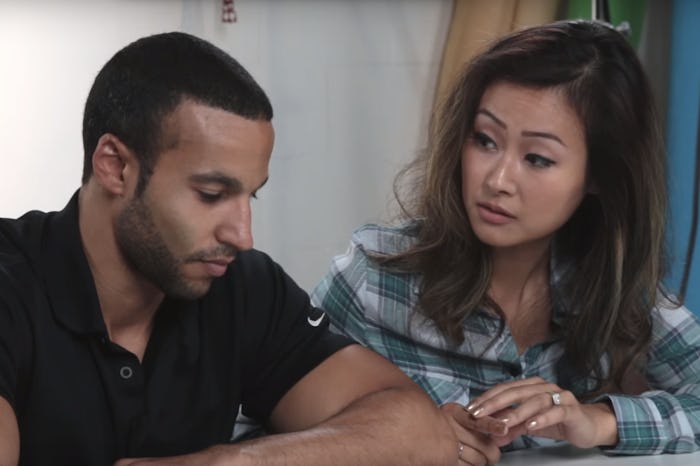There are many ways to form a family. Among these is adoption. According to the Adoption and Foster Care Analysis Reporting System 2015 Fiscal Year Report, there are currently 415,129 children living in foster care in the U.S. alone. Of those, only 50,644 were adopted in the past year. Why such small numbers? Although nearly 40% of Americans surveyed reported they would consider adoption, the majority of them are not. The fact is, there are many barriers to adoption, including high costs ($5,000 to $40,000 or more) and long delays within the actual process. The result: Even people who would love to adopt a child in theory don't end up going through with it for a number of reasons.
Cost considerations aside, before these would-be parents even begin cutting through the red tape, they have a lot of other questions to consider, such as what kind of child they would be willing to adopt. In this recent BuzzFeed video, several couples were given sample questions that they would encounter upon deciding to adopt. If you’ve ever considered bringing a child in need into your home (as I know I have), you will definitely want to watch this and see how you feel by the end of it:
Male Or Female?
While sex and gender are two separate things, adoption forms will ask which sex you prefer your child to be. Potential adoptive parents should keep in mind that currently 52% of children in U.S. foster care are male, meaning males have a slightly more difficult time being adopted. Additionally, they may want to keep in mind that their children may actually be transgender or gender fluid, and should prepare themselves how best to handle this (but we just went into a whole other conversation).
Age Of Child
Although many would-be parents imagine themselves adopting a baby from birth, the average age of adopted children is 9 years old. Adoptive parents need to understand that their chances of adopting are significantly greater if they are open to older children. Sadly, because of the desire to adopt young infants, many children end up staying in foster care their entire lives until they age out.
Race, Ethnicity, And Language
Although 42% of children up for adoption are white and only 24% are black, black babies are adopted less frequently. Because of this, black babies actually cost less to adopt (which is problematic in and of itself). Fortunately, these would-be parents are open to adopting children of all backgrounds. Anyone adopting may want to consider the various challenges of raising a baby of a different race, such as making sure their child also feels connected to their background while also being an accepted and loved part of their adoptive family.
Dental Issues?
One thing you might not have even thought about before is whether you’d be willing to adopt a child who had potential tooth decay, missing teeth, misaligned teeth, or other dental issues. This couple was all about adopting a child and helping them and their smile. Others may take pause at the additional financial cost of dental procedures and potential surgeries.
A Child With Fetal Alcohol Syndrome?
Sadly, many children up for adoption were born with fetal alcohol syndrome. Because of this, these kids have a higher rate of mental and behavioral issues later in life. Adoptive parents will want to be able to have the resources to handle this (perhaps by having one full-time stay-at-home parent and/or health insurance that will cover a variety of specialists).
Disabilities
Some of the kids that have the hardest time being placed in adoptive homes are ones with disabilities. This is extremely important to consider as a prospective parent, as to whether you feel that you (and your co-parent, if you have one) will be mentally, emotionally, and financially prepared to raise such a child in a loving and supportive way. One couple in the video feels that raising this special needs child would be all about nurture, while another person in the video fears he lacks the resources.
Other Mental And Behavioral Issues
This couple agrees they might be able to handle a child with adjustment disorder but also decide neither could handle raising one that had autism or Asperger’s syndrome. Considering that 1 in 45 children has been diagnosed with autism, with a higher prevalence in the disorder being found in boys, it’s incredibly important to consider that your adoptive child may have ir and/or may later be diagnosed with it. The questionnaire also asks if potential adoptive parents would be willing to raise a child with schizophrenia or other psychotic disorders. Most of the couples seemed to take pause at this question, unsurprisingly.
A Child Involved In Prostitution
Many children that end up in foster care were victims of child prostitution rings. Potential adoptive parents need to realize the severity of psychological and physical harm these children have experienced, and be prepared to deal with everything from depression to PTSD.
A Child Conceived As A Result Of Rape Or Incest
Women who become pregnant as a result of rape and/or incest will often abort or put their children up for adoption. Children from rape may either already know or later find out the circumstances under which they were conceived, and will certainly struggle with this knowledge. Additonally, children of incest are at a greater risk of being born with multiple birth defects including mental deficiencies and physical malformations.
In the end, many of the couples weren’t so sure they were ready to adopt or even become parents in any way. Going through this process seems to have been definitely an eye-opening experience, but a necessary one for anyone seriously considering this route.
Images: BuzzFeed/YouTube(10)
